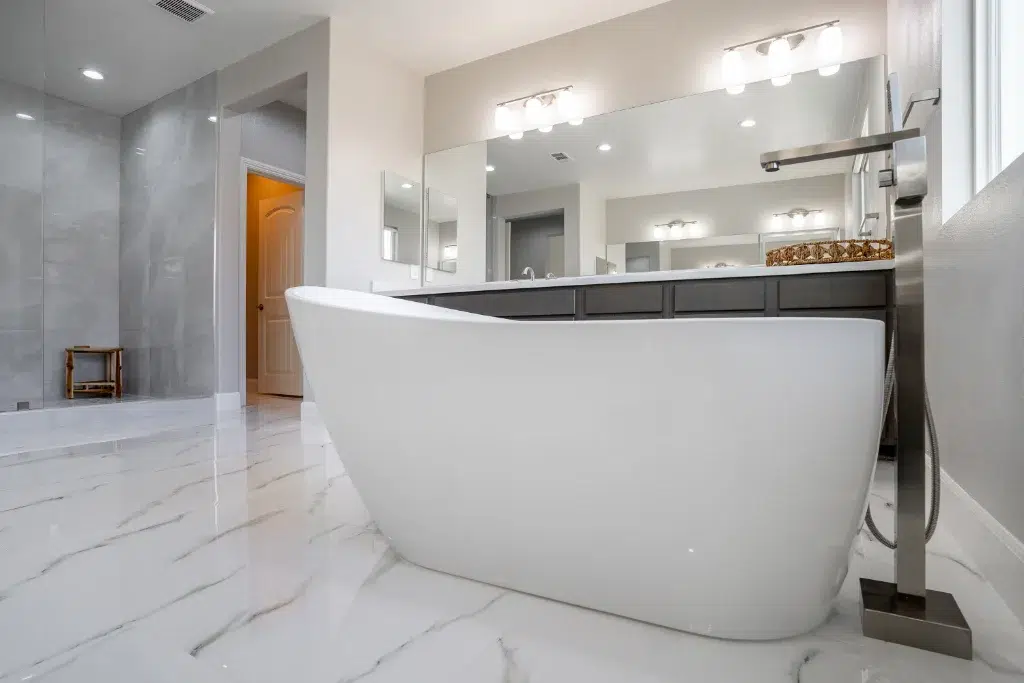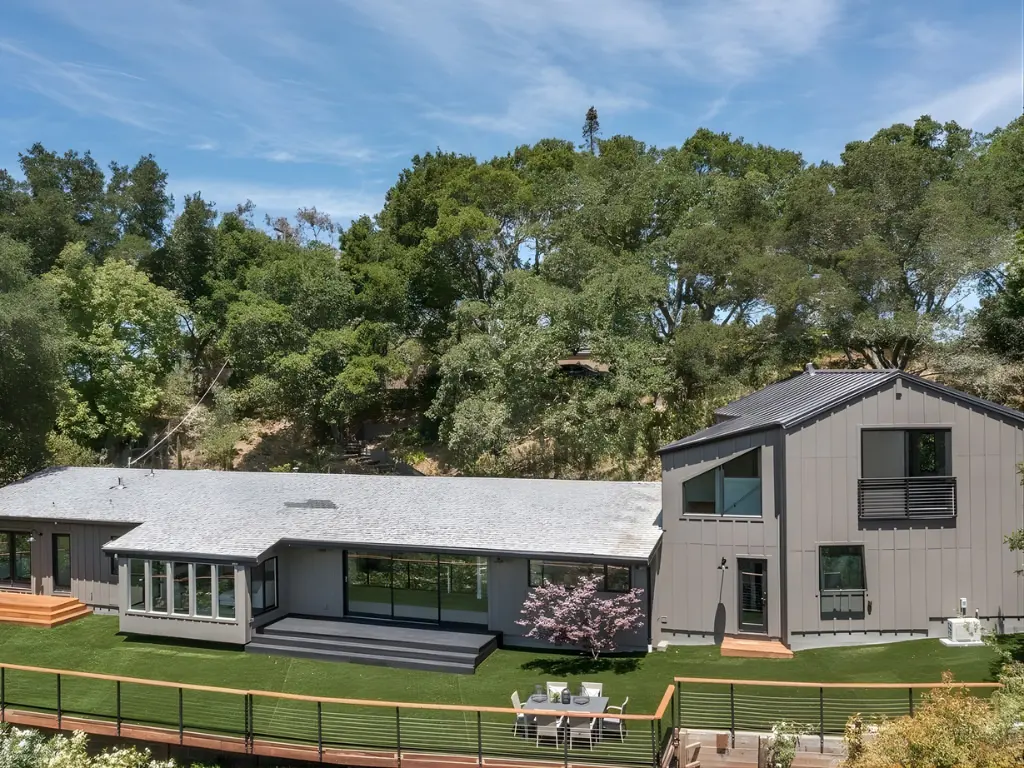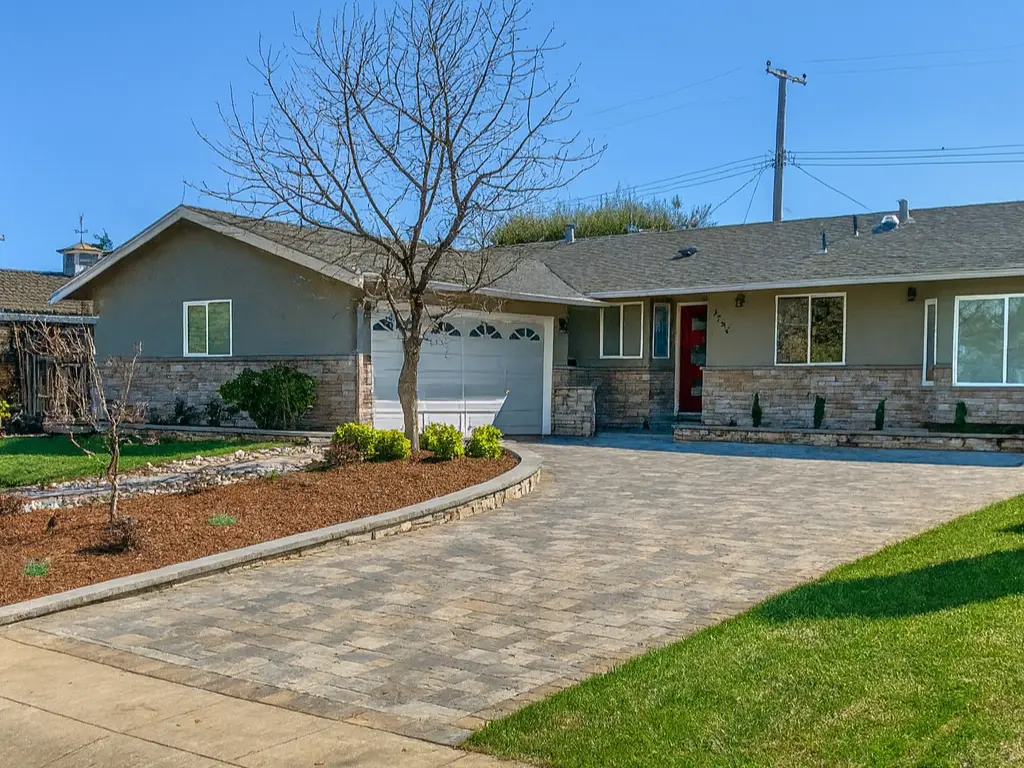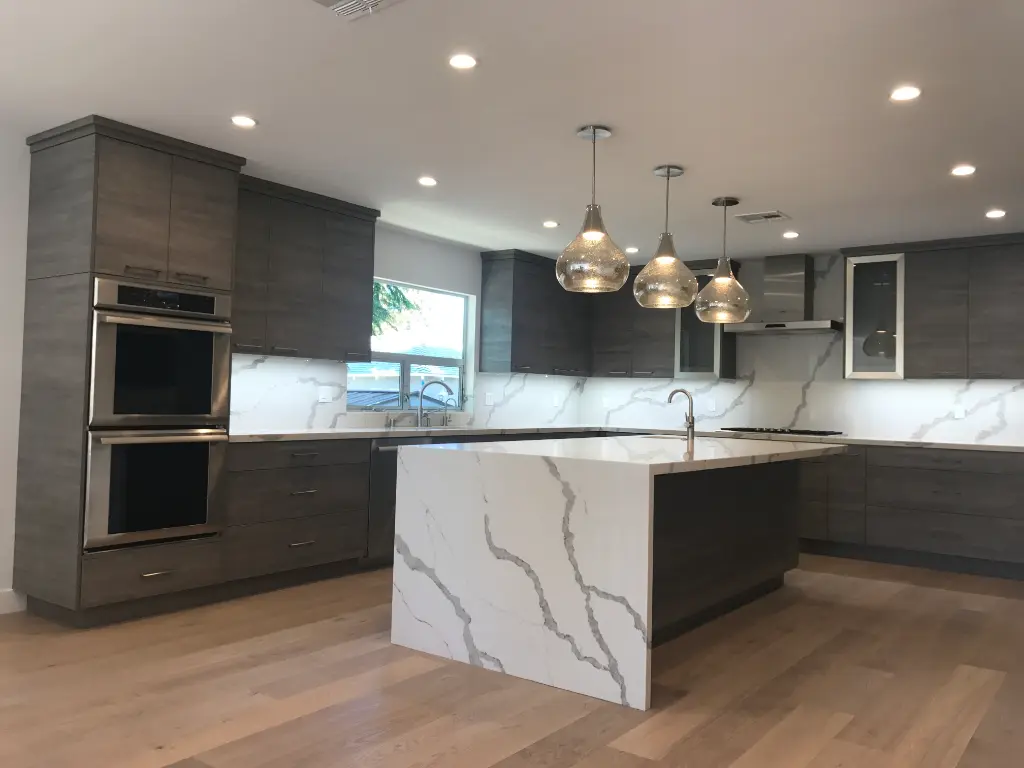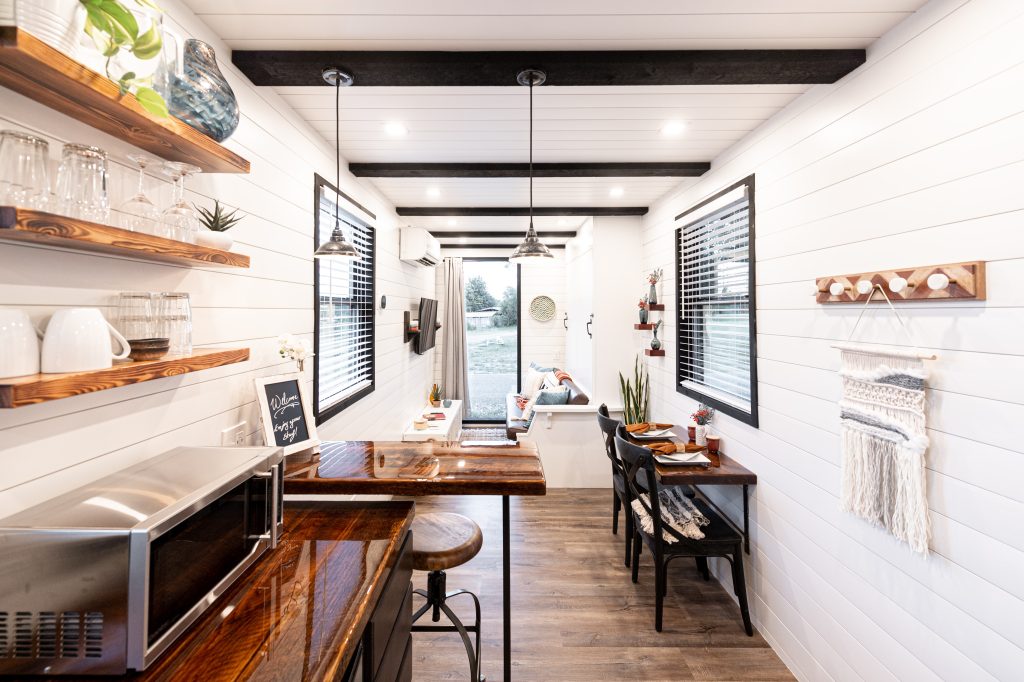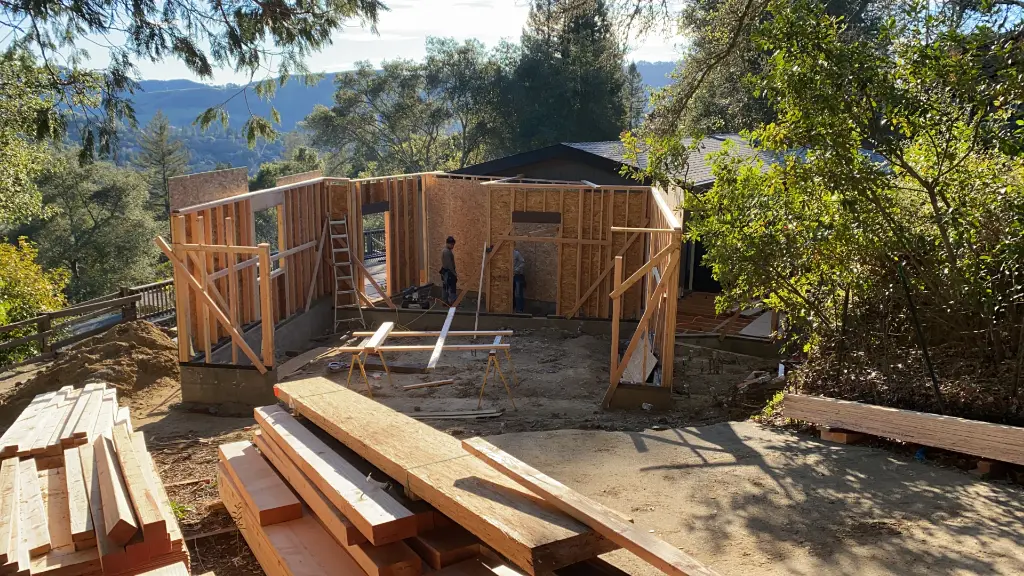As a residential homeowner, you may have considered converting your shower to a bathtub. This significant bathroom remodel brings up important questions about costs, benefits, and key factors to weigh. To determine if this project is right for your home and budget, continue reading to learn about average pricing, pros and cons, and key considerations before taking the plunge into a shower-to-bathtub conversion. With the insights from this article, you’ll be equipped to decide if switching your shower to a bathtub is the best option to enhance your home and lifestyle.
Why Convert Your Shower to Bathtub?

Most adults rely on showers for their daily routines, but bathrooms are not one-size-fits-all. As life changes, so do our needs, and converting your shower into a bathtub might be a perfect solution. Here are some compelling reasons to consider a shower-to-tub conversion:
- Mobility Needs: As we age, standing in the shower for long periods can become challenging. A bathtub provides a more accessible option, transforming your bathing experience from stressful to relaxing.
- Personal Preference: Sometimes, it’s as simple as preferring baths over showers. If you’ve been missing the comfort of a warm bubble bath, converting your shower can bring new joy to your daily routine.
- Ease of Cleaning: Showers can be tough to clean with all their nooks and crannies. A bathtub, on the other hand, is much easier to maintain, saving you time and effort.
- Remodeling Opportunities: If you’re already planning a bathroom remodel, adding a bathtub can enhance your space. With the right professional help, converting a shower to a tub can be quick and painless.
- Family-Friendly: For families with young children, bathtubs are often more convenient and safer for bathtime, making your daily routine easier.
- Therapeutic Benefits: Bathtubs offer therapeutic advantages, such as soothing sore muscles, aiding in injury recovery, and reducing anxiety. The relaxing qualities of a bath are hard to beat.
Is a Bathtub-to-Shower Conversion Right for You?
Evaluate Your Needs
Before embarking on a bathtub-to-shower conversion, it’s crucial to assess your personal preferences and requirements. A shower offers increased accessibility, especially for those with mobility issues or aging in place. However, if you have young children or enjoy relaxing soaks, a bathtub is more practical.
Consider Space Constraints
Converting a bathtub to a shower can create more open space in your bathroom. Showers generally require less square footage, allowing for a roomier layout. Conversely, if your bathroom is already compact, removing the bathtub may make the area feel cramped.
Weigh Resale Value
While preferences vary, some homebuyers may favor a property with at least one bathtub, particularly in homes with multiple bathrooms. A bathroom without a tub could potentially impact resale value, especially for growing families or those planning to age in place.
Factor in Costs
The cost of a bathtub-to-shower conversion can vary significantly depending on the scope of work, materials chosen, and any necessary plumbing or electrical modifications. Obtain multiple quotes from licensed professionals to ensure a realistic budget.
Assess Accessibility Needs
For individuals with mobility challenges, a curbless or low-threshold shower can significantly improve accessibility and safety. However, if you plan to age in place, consider retaining at least one bathtub for added versatility.
Explore Design Options
With a shower conversion, you have the opportunity to create a stylish and functional space tailored to your preferences. Explore various tile, fixture, and glass enclosure options to achieve your desired aesthetic while maximizing functionality.
The Benefits of Converting Your Bathtub to a Walk-in Shower

Converting your bathtub into a modern walk-in shower offers numerous advantages that can enhance both functionality and aesthetic appeal within your bathroom space. This transformative renovation project not only creates a luxurious, spa-like ambiance but also addresses practical considerations for improved accessibility and safety.
Increased Accessibility and Safety
As we age or face mobility challenges, navigating a traditional bathtub can become increasingly difficult and hazardous. A walk-in shower eliminates the need to step over a high tub wall, reducing the risk of slips and falls. This feature is particularly beneficial for seniors, individuals with disabilities, or those recovering from injuries, allowing for a safer and more comfortable bathing experience.
Enhanced Resale Value
Homebuyers today highly value well-designed, accessible bathrooms. By converting your bathtub to a walk-in shower, you are essentially future-proofing your home and increasing its overall appeal to potential buyers. This renovation can be a worthwhile investment, often recouping a significant portion of the cost upon resale.
Low-maintenance and Easy Cleaning
Walk-in showers are renowned for their low-maintenance nature. Without the cumbersome tub enclosure, cleaning becomes a breeze, as there are fewer nooks and crannies for grime and mildew to accumulate. This not only saves you time and effort but also contributes to a cleaner, more hygienic bathroom environment.
Space-Saving and Stylish Design
Contrary to popular belief, replacing a bathtub with a walk-in shower can actually create the illusion of a more spacious and open bathroom. By eliminating the bulky tub, you open up floor space, allowing for a sleek and modern design aesthetic. Additionally, walk-in showers offer a wealth of customization options, enabling you to incorporate stylish tile work, fixtures, and accessories that reflect your personal taste.
Water and Energy Efficiency
Walk-in showers typically require less water to operate compared to traditional bathtubs, resulting in lower water bills and a more environmentally friendly footprint. Furthermore, many modern shower systems feature water-saving fixtures and efficient drainage systems, further contributing to energy and resource conservation.
What to Expect During a Bathtub-to-Shower Conversion

Preparation Phase
As with any home renovation, proper preparation is key to a smooth bathtub-to-shower conversion process. You can expect the contractor to take the following initial steps:
- Obtaining necessary permits from local authorities to ensure compliance with building codes and regulations.
- Carefully remove the existing bathtub, along with any surrounding tiles, fixtures, or drywall, as needed.
- Assessing the plumbing and making any necessary adjustments or rerouting to accommodate the new shower setup.
Construction and Installation
Once the area is cleared and prepared, the active construction phase begins. During this stage, you can anticipate:
- Waterproofing the shower area with a proper moisture barrier and drainage system.
- Installing a shower pan or base, which serves as the foundation for the new shower enclosure.
- Erecting shower walls or enclosures which may involve tile work, glass panels, or prefabricated surrounds.
- Integrating new plumbing fixtures, such as the showerhead, faucets, and valves.
- Finishing touches like shelving, benches, or other desired features should be added to the shower space.
Final Touches and Inspection
As the project nears completion, the contractor will focus on the final details:
- Grout, caulk, and sealants are applied to ensure a watertight and visually appealing finish.
- Installing any additional accessories, such as grab bars, shower caddies, or towel racks.
- Conducting a thorough inspection to verify the proper installation and functionality of all components.
- Cleaning up the work area removing any debris or construction materials.
- Scheduling a final inspection with local authorities to obtain approval and sign-off on the completed project.
Open communication with your contractor throughout the conversion process is crucial. Don’t hesitate to ask questions, express concerns, or request updates on the progress. By understanding what to expect, you can better prepare yourself for the temporary disruptions and embrace the exciting transformation of your bathroom space.
How Much Does a Bathtub to Shower Conversion Cost?
Transforming your bathroom from a traditional bathtub setup to a modern walk-in shower can add beauty, functionality, and value to your home. However, before embarking on this renovation journey, it’s crucial to understand the associated costs.
Key Cost Factors
The total cost of converting a bathtub to a shower can vary significantly, primarily depending on the following factors:
- Size and Layout: Larger shower enclosures or custom designs will generally cost more than standard-sized prefabricated units.
- Materials: High-end materials like natural stone, frameless glass doors, and premium fixtures can substantially increase the overall expense.
- Labor: Hiring experienced and licensed contractors for demolition, plumbing, electrical work, and tiling can account for a significant portion of the total cost.
Average Cost Estimates
According to industry experts, the average cost of a bathtub-to-shower conversion ranges from $3,500 to $10,000 or more. However, these figures can vary based on your location, the complexity of the project, and the materials and features you choose.
Breaking Down the Costs
To give you a better idea, here’s a breakdown of some typical expenses:
- Demolition and Removal: $500 – $1,500
- Shower Base and Tiling: $1,000 – $4,000 (depending on materials)
- Shower Door and Enclosure: $800 – $3,000
- Plumbing and Fixtures: $1,000 – $3,500
- Labor: $1,200 – $3,000 (for a professional contractor)
It’s essential to remember that these are rough estimates, and the actual cost may differ based on your specific requirements and preferences.
Budgeting and Planning
To ensure a smooth and stress-free renovation process, it’s advisable to allocate an additional 10–20% of the estimated cost for unforeseen expenses or contingencies. Additionally, obtaining multiple quotes from reputable contractors can help you find the best value for your money.
By carefully considering the various cost factors, setting a realistic budget, and selecting high-quality yet cost-effective materials, you can create a stunning shower that not only enhances your daily routine but also adds value to your home.
How to Do a Shower to Tub Conversion
So, how does the bath conversion process work? Here’s what you can expect during your shower-to-tub conversion:
- Research Contractors: The first and most crucial step is finding a qualified bathroom remodeler. Research local contractors who specialize in shower-to-tub conversions to ensure a smooth and efficient installation.
- Order Your Tub: After your contractor inspects your bathroom and takes measurements, they will order a bathtub that fits perfectly in the space where your shower currently is.
- Demo Shower: Once the bathtub arrives, the contractor will begin by removing your existing shower. This may include removing tiles to prepare your bathroom for the new tub.
- Install Tub: With the old shower cleared out, it’s time to install your new acrylic tub. Many remodelers will also add acrylic shower panels to make your bathroom easy to clean and maintain. After installation, your contractor will clean up, and your shower-to-tub conversion will be complete!
Schedule Your Shower To Bathtub Conversion Today! ☎️
Are you ready to transform your bathroom? If you’re considering a shower-to-tub conversion, you deserve the best team to bring your vision to life. At Rhino Builders, we’re experts in bathroom remodeling, committed to creating a space that perfectly fits your lifestyle and preferences.
As you consider this exciting upgrade, think about your personal preferences, lifestyle needs, and budget. While a bathtub offers a relaxing soak, it requires more time and water than a shower. Evaluate the costs for the tub, plumbing changes, and overall remodeling expenses. With careful planning and research, you can decide if this project is the right fit for your home. Prioritize safety and quality to achieve a beautiful, functional new bathing space.
Trust your instincts—if a bathtub aligns with your routine, the investment can bring comfort and joy for years to come. Ready to take the plunge? Contact Rhino Builders today for a free quote on your shower-to-tub conversion!
FAQs
Can I turn my shower into a bathtub?
Yes, you can turn your shower into a bathtub. This process involves removing the existing shower, making any necessary plumbing adjustments, and installing a new bathtub. Hiring a professional contractor will ensure the job is done correctly and efficiently.
How much does a shower to bathtub conversion cost?
The overall cost can vary significantly based on factors like the bathroom size, materials chosen, labor costs in your area, and any additional work required. On average, expect to pay between $3,000 to $8,000 for a basic shower-to-bathtub conversion. More luxurious upgrades or addressing underlying issues can increase the price further.
Is it cheaper to have a bathtub or a shower?
In general, showers are often less expensive to install and maintain than bathtubs. However, the overall cost can vary depending on the specific models and materials chosen for either option. Additionally, converting a shower to a bathtub can be a more significant investment than installing a new shower.
How long does a shower to bathtub conversion take?
The duration can range from a few days to a week or more, depending on the complexity of the project and any unforeseen issues that arise. Factors like the need for waterproofing, retiling, or addressing structural concerns can prolong the timeline.
Can I convert a bathtub to a shower instead?
Absolutely! Converting a bathtub to a shower is also a popular renovation option. This process involves removing the existing bathtub, modifying plumbing lines, installing a shower base or pan, and adding necessary shower enclosures, tiles, and fixtures.
Do I need permits for a shower to bathtub conversion?
In most areas, permits are required for any significant bathroom renovation, including a shower-to-bathtub conversion. Consult with your local building authorities to understand the specific requirements and ensure compliance with all relevant codes and regulations.
By addressing these common FAQs, homeowners can better understand the process, costs, and considerations involved in converting a shower to a bathtub, empowering them to make an informed decision about their bathroom renovation project.

